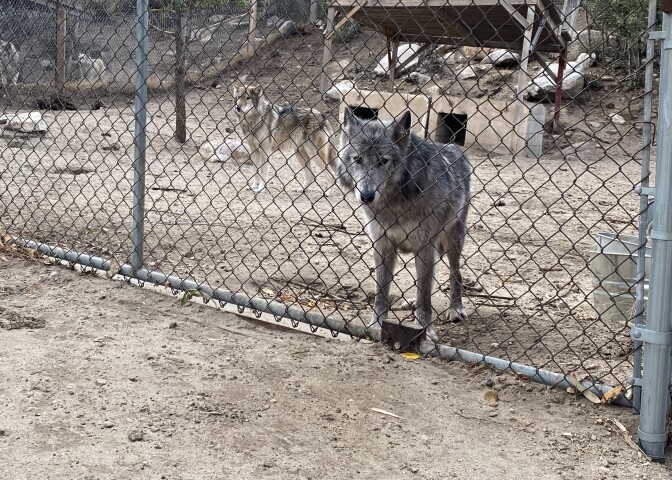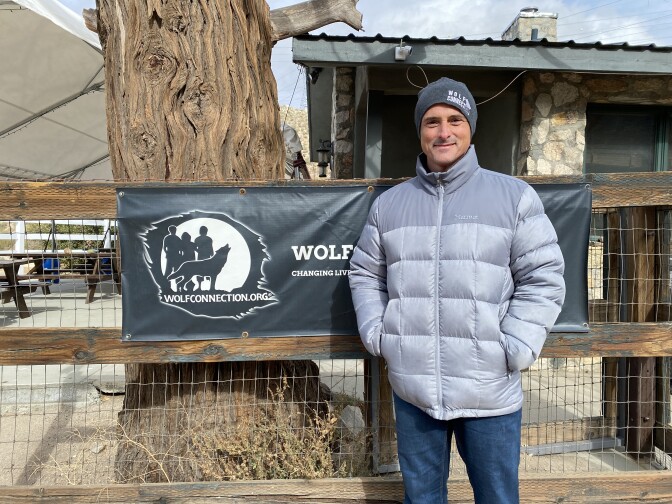This story is free to read because readers choose to support LAist. If you find value in independent local reporting, make a donation to power our newsroom today.
Can Wolves Help Humans With Their Mental Health? Wolf Connection Says Its Pack Does

Numerous studies show having a pet dog can have a very positive effect on human mental health.
A nonprofit in Palmdale takes that idea and goes a bit bigger: it hooks people up with wolves.
Wolf Connection uses what it calls “wolf-based therapy” to help firefighters, military veterans, formerly incarcerated people and youth who are struggling in school with their mental health.
Clients spend time with one of the group’s 33 wolves — always accompanied by a handler, of course. The idea is that by learning the animal’s story and about the dynamics of a pack, the humans can learn to deal with their own traumas and pick up new social skills.
On Monday, Wolf Connection broke ground on a $2 million expansion of its “Educational Sanctuary and Wilderness Retreat Center,” which will allow it to double the size of its pack and offer its programs to more young people.

The group’s youth programs include a two-month curriculum that has students coming to the ranch one day a week for outdoor experiences with the wolves (like hikes) and somatic therapy.
Edward Amaya first started hanging out at Wolf Connection as a student attending a continuation school. He said he struggled in a classroom setting. "I'm very much a physical learner,” Amaya said. “When it comes to sitting and paying attention, I zone out."
He found his experiences at Wolf Connection so fulfilling that he now works there.
Amaya said many of the wolves are rescued and have experienced trauma and neglect, and that can help program participants process their own stories.
He likes to recall a moment he had with Kenai, a sandy brown and black wolf dog who was rescued. Kenai is shy around people, but one day he made a special connection with Amaya when a group of people was lined up to meet the wolf.
“I was at the very end and he decided to do the entire line for the very first time, ever,” he said with a sense of pride.
“He got to the end and he put his forehead against mine [and] people told me he closed his eyes,” Amaya said. “Big lick across the face and then he walked away.”
Wolf Connection conducted a study with Claremont Graduate University of kids who were cycling in and out of school expulsions and found that “100% of the kids that came to Wolf Connection over a 10-year period never got expelled again,” according to the group’s founder, Teo Alfero.

Alfero said Wolf Connection currently has contracts with the L.A. County Department of Veteran Affairs, the Department of Public Social Services, the Department of Mental Health and other organizations.
“The work that’s done here, the healing that can occur for people who have suffered trauma, is unparalleled in terms of its impact,” Mental Health Director Jonathan Sherin Sherin said at Monday’s groundbreaking. “We too often want to find people that have suffered trauma and find out how to medicate them ... and that’s not the only solution.”
While he didn’t provide a specific amount, Alfero said "the initial investment and groundbreaking is a result of the generosity of David Casselman," an L.A. lawyer and member of Wolf Connection’s board.
Ask For Help
- Steinberg Institute website, links to mental health resources and care throughout California
- Institute on Aging's 24/7 Friendship Line (especially for people who have disabilities or are over 60), 1-800-971-0016 or call 415-750-4138 to volunteer.
- Los Angeles County Department of Mental Health, 24/7 Access Line 1-800-854-7771.
- The Crisis Text Line, Text "HOME" (741-741) to reach a trained crisis counselor.
- California Psychological Association Find a Psychologist Locator
- Psychology Today guide to therapist
If You Need Immediate Help
- If you or someone you know is in crisis and need immediate help, call the Suicide Prevention Lifeline at 988 or go here for online chat.
More Guidance
- Find 5 Action Steps for helping someone who may be suicidal, from the National Suicide Prevention Lifeline.
- Six questions to ask to help assess the severity of someone's suicide risk, from the Columbia Lighthouse Project.
- To prevent a future crisis, here's how to help someone make a safety plan.








